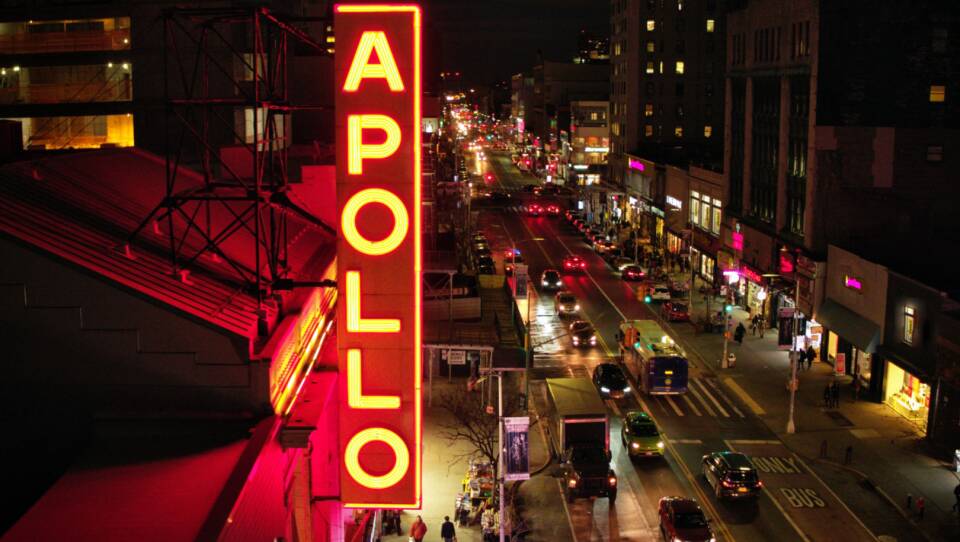"The Apollo" is a documentary that chronicles the history and legacy of New York City’s landmark Apollo Theater. The film weaves together archival clips of music, comedy and dance performances; behind-the-scenes verité footage of the team that makes the theater run; and interviews with artists like Jamie Foxx, Angela Bassett, Pharrell Williams, Common, Patti LaBelle and Smokey Robinson.
While uncovering the rich history of the internationally renowned theater that has influenced American music and culture for 85 years, Academy and Emmy Award-winning director Roger Ross Williams also examines the current state of race in America, following a new multi-media adaptation of Ta-Nehisi Coates’ best-selling book “Between the World and Me” as it comes together on the theater’s grand stage.
WGBH Arts Editor Jared Bowen spoke with producer Lisa Cortes about the film's influence, and how it took years of work to pull together its rich story.
This interview was conducted at the 24th annual Nantucket Film Festival.
You have the story and then all of the archival materials, and then the different societal threads. How did you approach this, given the wealth of materials that you had?
Lisa Cortes: The Apollo Theater documentary covers 85 years of the theater's history and just saying that is daunting. We were really lucky to have Roger Ross Williams as our director, and he always had this vision that the story begins with the history of the theater and where it's going. But, you cannot tell that story separate from the experiences of African Americans and so that was the continuous directive—to weave a narrative that is about the theater. It's about great artists who got their start there, epic performances, but also what is happening in America, what is happening to African Americans, and how is it that African Americans in particular, on this stage have used entertainment as a mode of lifting ourselves out of oppression. But also using the art that we create as part of our social capital, social currency, and social criticism.
Why is it that the Apollo became the place that would become the nexus for a lot of the things that you just described?
LC: The Apollo sits, I like to say at interesting crossroads, because it was in New York City, 125th St., Harlem, a mecca for so many people and particularly African Americans. It was also one of the first places where black audiences could go and not sit up in the balcony. You could go and you could see the best and the brightest of the new talent whether it was Ella Fitzgerald, Leslie Uggams, Eartha Kitt, the Motor Town Revue to Pharrell Williams and U2. They were there last year. It's funny, it echoes what I was talking about with this film festival—that you want to go to this theater because you're going to have an exchange with your audience. They're going to tell you if they like it or not. They're going to be engaged and invested in what you're doing. And I think for performers that is a great challenge. But if you win, you win big time.
I was just struck by the wealth of material you had access to. All those videos, all the firsthand accounts going back decades. Those great performers are legends now, who are documented in their initial forays on that stage. What was it like to sift through the material that you had?
LC: The film is this wonderful gumbo of verité, of interview, of performances. It's rich in archival. It was done with an incredible team that worked on the film for many years and then it was really artfully put together by our editors, Jean Tsien and John Fisher.
One of the story threads is what the theater has been and what it is today after its struggles in more recent memory. How do you describe the Apollo of today, and what its place in New York is, or even in this country?
LC: I think the Apollo of today continues a rich legacy and is true north for innovative performances, conversations, and town hall meetings. It is a beacon for that type of community exchanges and engagement.
I'm sure you've probably had many memorable experiences in your years working on this project. What's your most memorable experience in the theater?
LC: One of the most memorable experiences in the theater making the film? There's so many! I think it was the night that we filmed the first performance of the stage readings of Ta-Nehisi Coates' "Between the World and Me." Not only did we have the chance to document the creation of this really important translation of a book into a theater piece, but that first night to be there when these incredible performers like Joe Morton, Angela Bassett, Common and Black Thought from The Roots took this material and presented it to an audience for the first time. The book by Ta-Nehisi Coates is so important and needed during this time and for the future. And to be a part of witnessing that creation, presentation and reception—and it all coming full circle on that night when it was presented—was incredibly special because this film makes history rich. It tells the story of African American contributions to entertainment, but also to society and to politics and it’s very fresh in its presentation. You walk away going "I never knew that, I didn't know about these riots in Harlem, I didn't know about..." and so on. The continuum of the experience.
I love the living history that the Apollo represents and what this film was able to present.
Thank you so much for speaking with us. We really appreciate it.
LC: Thank you.
"The Apollo" debuts this fall on HBO.




